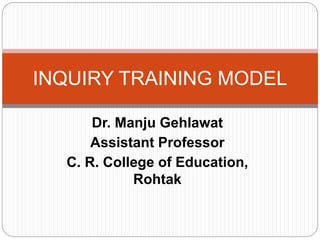
Inquiry training model
- 1. Dr. Manju Gehlawat Assistant Professor C. R. College of Education, Rohtak INQUIRY TRAINING MODEL
- 2. INQUIRY TRAINING MODEL This model was designed by Richard Suchman to teach students to engage in casual reasoning and to become more fluent and precise in asking questions, building concepts and hypotheses, and testing them. Inquiry learning provides opportunities for students to experience and acquire processes through which they can gather information about the world. It belongs to the information processing family of teaching models. This requires a high level of interaction among the learner, the teacher, area of study, available resources, and the learning environment, students become actively involved in the learning process as they: • Act upon their curiosity and interests; • Develop questions; • Think their way through controversies or dilemmas; • Look at problems analytically; • Inquire into their preconceptions and what they already know; Develop, clarify and test hypotheses; • Draw inferences and generate possible solutions.
- 3. ASSUMPTIONS OF THE MODEL • All knowledge is tentative; • Most of the problems are amenable to several equally plausible explanations. There is no one particular answer to a problem; • Inquiry is natural. All of us often inquire when confronted with a problematic situation or puzzle; • An individual can be made amenable to the process of inquiry. He can be made to learn to analyze his thinking strategies; • In addition to what is already known to an individual, he may be taught the new strategies to enquire and explore things; • The inquiry process is a co-operative effort. It is always
- 4. OBJECTIVES OF THE MODEL • To develop the scientific process skills; • To develop among students the strategies for creative inquiry; • To develop among students independence or autonomy in learning; • To develop among students the ability to tolerate ambiguity; • To make students understand the tentative nature of knowledge; and • To develop the spirit of creativity among students. ELEMENTS OF INQUIRY TRAINING MODEL 1. Focus: The goal of this model is to help students develop the intellectual discipline and skills necessary to raise questions and search out answers streaming from their curiosity; 2. Syntax: the Inquiry Training Model has five phases- Phase 1 Confrontation with the problem Phase 2 Data Gathering (Verification) Phase 3 Data Gathering (Experimentation)
- 5. 3. Social System: Inquiry Training model provides high weight to the controlling of social system. Teacher and students, however participate as equals where exchange of ideas is concerned; 4. Principles of Reaction: It involves the following: • Ensuring that questions are phrased so that they can be answered in ‘Yes’ or ‘No’; • Asking students to rephrase invalid questions; • Neither approving nor rejecting student theories (hypotheses); • Pressing students for clearer statements of theories and more support for generalizations; • Encouraging interaction among students.
- 6. 5. Support System: A set of confronting materials and resource materials bearing on the problem for inquiry are needed. Sometimes the materials are not available. Teachers will have to develop such materials; 6. Application/Nurturant Effects: This model was developed for natural sciences to start with, but its procedures can be used in all subject areas. Any event topic from a curriculum area, which can be converted into a problem situation, can be selected for inquiry training.
- 7. ADVANTAGES OF INQUIRY TRAINING MODEL • It develops the scientific process skills; • It develops among students the strategies for creative inquiry; • It develops among students independence or autonomy in learning; • It develops among students the ability to tolerate ambiguity; • It make students understand the tentative nature of knowledge; and • It develops the spirit of creativity among students. LIMITATIONS OF INQUIRY TRAINING MODEL • This model does not help in teaching primary content or subject matter, for example, ne concepts and formula; • If the information about the puzzle is not presented in the form of a problem requiring explanation, the student cannot effectively arrive at generalization through inquiry. In such cases simulation may be more useful;
- 8. CONCLUSION The Inquiry Training model promotes the processing skills which are helpful for inquiring. The process skills therefore include the observing, collecting and organizing data, identifying the variables in a situation, formulating hypothesis based on cause-effect relationship, experimenting or otherwise listing the hypothesis, inferring and drawing conclusions. REFRENCES • https://physicscatalyst.com/graduation/inquiry-training- model/ • Joyce, B. Weil, & Calhoun, E. (2009). Models of Teaching and Learning. 8th ed. Boston: Allyn and Bacon.